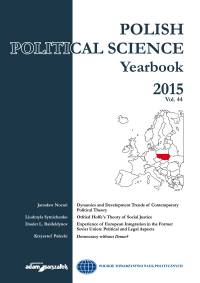ОTFRIED HÖFFE’S THEORY OF SOCIAL JUSTICE
ОTFRIED HÖFFE’S THEORY OF SOCIAL JUSTICE
Author(s): Liudmyla SytnichenkoSubject(s): Political Philosophy, Politics and law, Politics and society, History and theory of political science
Published by: Wydawnictwo Adam Marszałek
Keywords: social justice; recognition; solidarity; moral grounds; freedom; transcendental exchange
Summary/Abstract: The problem of justice, one of the key problems of contemporary political philosophy, is reconsidered in the light of a new paradigm: Оtfried Hoffe’s theory of transcendental exchange. The main research question is how this theory influences our understanding of the ways of formation of just moral and legal grounds in contemporary society. In order to understand justice adequately, it is important to regard it as personal responsibility, deeply related to attitudes of solidarity and recognition. There is an attempt to fuse moral and material grounds of social existence in order to overcome social injustice. Freedom and justice are rooted in the living world and are based on formal norms and procedures of morality and law. This gives us methodological grounds for understanding Hoffe’s philosophy of political justice, which regards freedom and justice as the main conditions of human existence.
Journal: Polish Political Science Yearbook
- Issue Year: 44/2015
- Issue No: 1
- Page Range: 23-31
- Page Count: 9
- Language: English

